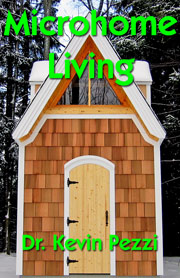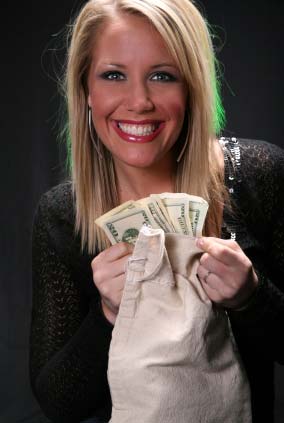Things to remember once you become a doctor: Financial matters
by Kevin Pezzi, MD
 1. Some people will take advantage of you economically. Here are two examples that happened to me:
1. Some people will take advantage of you economically. Here are two examples that happened to me:
- I had a water softener installed in my first home, purchased from an independent dealer of one of the big-name water softener companies. I assumed that they'd give me the same price they gave to everyone else, but I later discovered that they charged me about double their normally inflated fee. Yes, I was naive for not shopping around, but double?
- When I bought my first two homes, I was stupid enough to tell the real estate agents that I was a doctor. That seems harmless enough, right? In the United States, one of the most common first questions you ask a new acquaintance is, "What do you do for a living?" In Michigan and other states, the real estate agent representing the seller has a fiduciary responsibility to that seller to use every morsel of information they collect about the prospective buyer to wring the most money from him or her. The economic stereotype of doctors is that they're loaded and not particularly astute in financial matters; hence great prey for someone looking for a windfall—and I was living proof of that! :-) So don't tell the agent that you are a doctor. If you do, you may as well forget about driving a hard bargain for the home. The seller and his agent will assume that you can afford to pay more, so unless you tender a full-price offer, they will likely counter-offer a price that is slightly higher than what they would have tried to obtain from a non-physician.
2. The most astute doctor I ever met, Greg, once told me that one of the biggest financial mistakes that doctors make is to be "house poor."
People who spend too much on house payments and maintenance are "house poor." Doctors often think that they need a big, expensive home because they're doctors. Real estate agents and lenders often encourage doctors—and just about everyone else, for that matter—to stretch themselves when buying a home, advising you to "Buy all the house you can afford!" They have a vested interest in selling more expensive homes, and are as credible as a baker who encourages you to buy more muffins because you look too thin.
Ignore their advice, and follow Greg's. Live well within your means. By doing that, you will eliminate one of the greatest stresses in life: worrying about money. It fractures marriages, and drives some people to commit suicide.
“It's easy to underestimate the real cost of home ownership.”
— Financial advisor Suze Orman
If you have a nice nest egg, you give yourself freedom that can mitigate other stresses. For example, if you detest working at a particular ER, you are freer to quit and move elsewhere if you have adequate savings. If you're living paycheck to paycheck (and some doctors do!), quitting is not an option unless you can line up a new job in advance.
Furthermore, just because you can do something doesn't mean that you should do something. A case in point: Al Gore loves to lecture us on the perils of global warming, and he exhorts us to use less energy. I'm all for using less energy, but why doesn't he do it, too? I've read several published reports saying that the energy bill for his home last year was 20 times the national average.
Sheesh, how large is his home? As big as a football field? One of my friends knows Gore, and she never mentioned that his house is enormous, so I wonder how he could use so much energy. Gore is smart enough to know the value of replacing incandescent lights with compact fluorescent lamps, so he could reap some energy savings there. (On second thought, that's not a good idea; see my article, How fluorescent bulbs turn us into sheeple/Where has all the brainpower gone?) Former Vice-President Gore is very wealthy, so he could afford to be energy independent, obtaining all of his needs from solar and wind energy. I've heard that his wife Tipper suffers from depression, so perhaps he has dozens of high-wattage lights in every room to give her what amounts to a whole-house light box (light boxes are used in treating depressed people with seasonal affective disorder). Who knows? Such off-the-scale energy usage really makes me wonder.
Believe it or not, but I am not trying to be flip. I think that Gore is a hypocrite on the energy issue, but I love the fact that he has a very active mind, is a deep thinker, and is interested in health (I gave him two copies of my book Fascinating Health Secrets). Our mutual friend told me that he is much smarter than Bill Clinton (she knew him, too). People think that Al Gore is less intelligent than he really is because of his reputed anxiety while speaking before large audiences. Had he consulted me, I could have helped him overcome that problem, and he might be President today. (If you're reading this, Al, it's not information that I put in Fascinating Health Secrets.)
So while you as a doctor may be able to afford a large home and use lots of energy, you should not necessarily do it unless you need a large home for a big family. Save your money, and you will help save the planet.
If any real estate agents read this, they may object, giving the old advice about homes being a great investment as they appreciate in value. That may have been good advice at one time, but home prices are now plateauing in many areas and even receding in some. Furthermore, many of the historical gains in home value were illusory.

I've noticed that people who live in large homes tend
to hole up in them instead of spending time outdoors.
Let's consider two homes that both appreciated 20% over three years. One home initially cost $200,000 (Home A), and the other larger one $400,000 (Home B). The homes sold for $240,000 and $480,000, reaping capital gains of $40,000 for Home A and $80,000 for Home B. Based on this, you might conclude that you would have made $40,000 more by buying Home B. Not so fast. If you paid a 6% realtor commission, that would erase $14,400 of the profit from Home A but $28,800 from B. Considering this, the capital gain difference is now $25,600 instead of $40,000. Real estate transfer taxes in Michigan would eat up about $2000 of the gain from A but $4000 from B, thus lowering B's net capital gain advantage to $23,600.
The person who bought and sold Home B would not reap all of that $23,600 because he or she would have paid more for property taxes. I paid almost $1000 per month in property taxes on my first home, which I owned for three years. If my home had been half the price, as in the current example, I would have saved $6000 per year or $18,000 total. Factor that in, and the capital gain difference now plummets, but not quite as much as you may think, because property taxes can be used as a deduction to offset some income. Depending on the income and other deductions for the homeowners, the apparent savings of $18,000 might shrink to about $10,000. Therefore, the capital gain difference is now $13,600.
The person who bought and sold Home B would have also paid more for title insurance (incidentally, an editorial in Forbes magazine several months ago exposed how title insurance fees are grossly overpriced considering how little financial risk is assumed by title insurance companies). The owner would have also paid thousands more for utilities, homeowners insurance, maintenance, and repairs. The yearly difference in cost could easily be $4500, or $13,500 over the 3-year period of ownership. The capital gain difference is now just $100, thus virtually erasing the initial but illusory $40,000 difference.
Want more fun and less work?
Want smiles, not stress?
Read Dr. Pezzi's free e-book
Microhome Living

Am I through yet? Not quite. People who buy more expensive homes may pay a higher loan interest rate (as I did) for what bankers term a "jumbo loan." Unless you like empty rooms and walls, you will need to buy more to furnish the larger, more expensive home, and you'll pay more to move those possessions when you buy your next home (I spent about $11,000 [adjusted for interim inflation] when I moved out of my McMansion). That $40,000 gain is now completely erased; in fact, you would lose money by purchasing the more expensive home. So much for the advice about homes being a good investment.
Reference: Study says homeowners shouldn't count on property appreciation creating wealth
The financial advantage of buying Home A becomes even more pronounced if you consider one additional important factor: the money you save by buying and maintaining the less expensive home could be invested in stocks or bonds. Or you could invest in your own business, as I have done. I have also personally financed the development of my inventions, including the one I'm now working on that will revolutionize one of the most basic things that people do every day. If I were house poor, I couldn't attempt such an ambitious project. If I were to ask a banker to finance that project, he might say something such as, "You want to do what? That's the stuff of science fiction. Even major corporations aren't attempting to do that because it's too difficult. You're a doctor, and you think that you can out-engineer them?"
I don't think I can, I know I can, and I'm doing it.

Real estate agents can earn more than doctors!
My final bit of financial advice for today also pertains to real estate agents: Consider becoming one, instead of going into medicine. To put it colloquially, medicine "ain't what it used to be" from a financial standpoint, and more than a few doctors are transitioning to other careers. (I discussed this in my blog while commenting on a recent article in Time magazine entitled "Doctors without Dollars"; here's a link to that posting.) The income of an average real estate agent doesn't match that of an average doctor, but this is not a valid comparison. If you have the brains, conscientiousness, and drive to become a doctor, you will be near the top of the bell curve of realtors. If you put the same time into real estate as you would have training to become a doctor and then practicing medicine, you could easily earn more than an average doctor. If you are skeptical, read my analysis of how medicine can be less lucrative than being a truck driver or autoworker.
The threshold for becoming a realtor is so low that this profession attracts some people who are lazy and not particularly intelligent. On the other end of the spectrum are realtors like Traverse City's Jack Lane, co-host of "Ask the Real Estate Guy" on WTCM (AM 580) from 8 to 9 on Saturday mornings. He is very smart, knowledgeable, eloquent, and a hard worker. He's at the top of the real estate bell curve, and his earnings probably reflect that.
More about being “house poor”
Years ago, I mowed the yard of a wealthy man who owned a chain of big stores. I said “mowed the yard,” not “mowed the grass,” because he had more weeds than grass. His house was small and plain. He could have done what most people do: buy a nice home if they can afford one. Instead, he put his money in his business and became very rich.
More about advice from real estate agents
My advice? Don't follow it. They want to profit from you, not be your buddy. The warm and fuzzy charm they often exude is just another clever tool they use to get more of your money. Some of them are genuinely nice people, of course, but most agents use niceness as honey to get what they want: money.
In the early 1990s, after deciding to move up north so I'd have more snow to snowmobile on (before I realized that too many snowmobilers are recklessly dangerous speed freaks, as I discussed in Snowmobile trails painted with blood), I drove to a real estate office in one of the big snowbelt towns. The receptionist whisked me in to see the owner, a stunningly beautiful 30-ish woman who looked like an upscale New York model. I explained what I wanted: a small, inexpensive home to replace the McMansion that made me so McMiserable. I wanted much less home so I'd have much less need to work in the ER so I could spend more time inventing.
As we drove around looking at various homes, she gave me the “you're a doctor, you should live in a big home” talk. And, stupid me, I listened. At that time, I was a decade away from getting over my fixation on beauty, so if something came out of the mouth of an über-yummy fox, I listened. Über-mistake! I upsized in size and downsized in price, but not nearly as much as I should have. I lived there four years and then corrected my mistake.
One of the best things to have is free time, whether you use it to invent (as I did) or just to have more fun and time with your friends and family.
A Life Lesson™: More money can buy you more stuff but not the time to maintain it or enjoy it.
Back to the main Question & Answer page
Notes:
- Smart in Medicine or Law, but Not in Managing Money
- 'Shark Tank' investor Kevin O'Leary's outlook on money will make you suspicious of everyone you meet
- Kareem Abdul-Jabbar: I Hired an Idiot to Manage My Money
Excerpt: “Offering some life advice for a younger version of himself in an Esquire column, retired NBA superstar Kareem Abdul-Jabbar provided some poignant anecdotal evidence on investing.”
Comment: Providing the advice you'd give to a younger you is an excellent idea and something more people should do because that advice could help others—IF they'd listen. There's the rub: Young people often tune out advice from older people, thinking they know better. They're so young, so smart, so hip, so wise—or so they think. A case in point: the advice I've given in this site, ERbook.net, and countless e-mail messages. Of the ones who assiduously followed my advice and stayed in contact with me, can you guess how many made it into medical school and excelled? 100%. - Glass houses: Your personality helps predict your real estate choices
